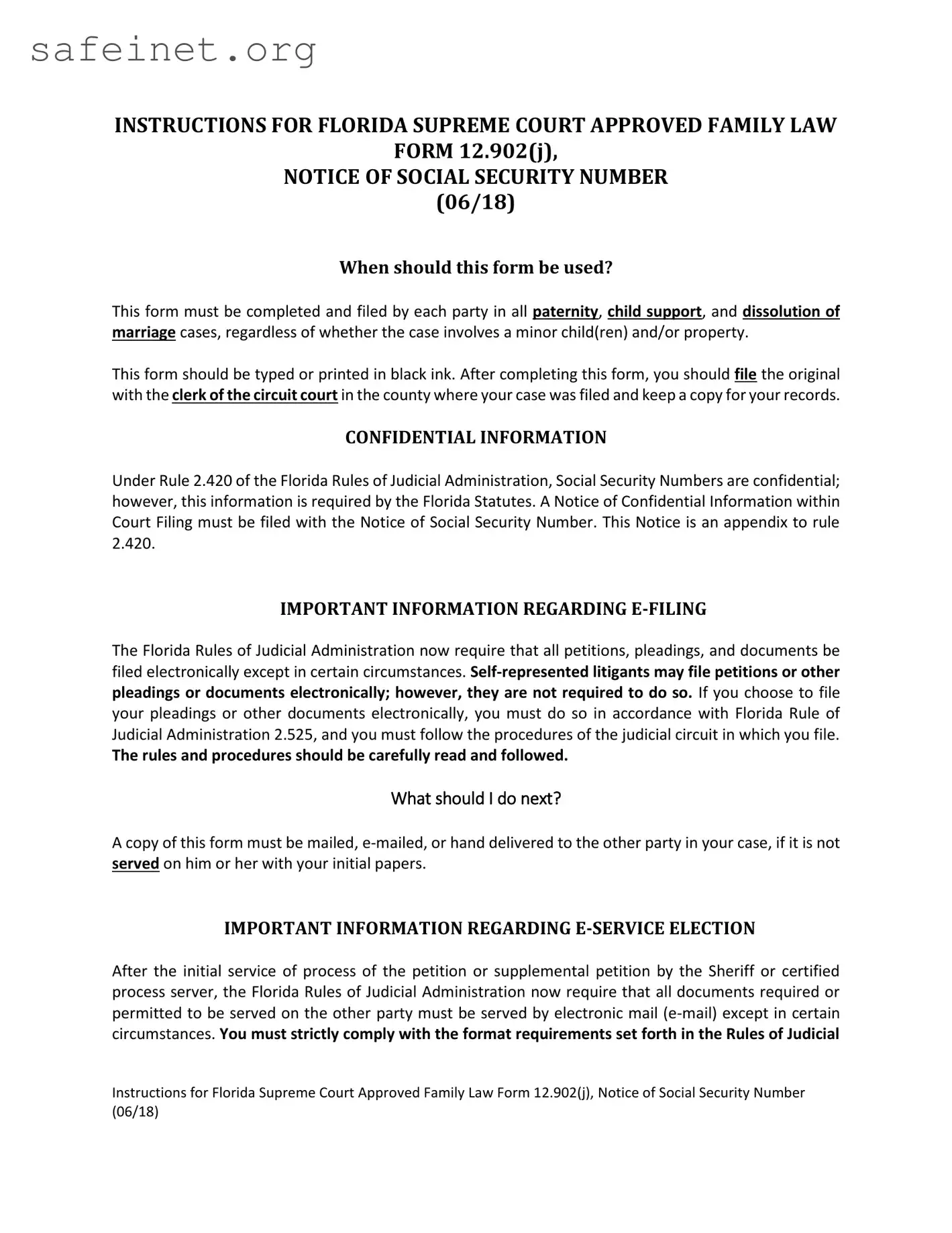INSTRUCTIONS FOR FLORIDA SUPREME COURT APPROVED FAMILY LAW
FORM 12.902(j),
NOTICE OF SOCIAL SECURITY NUMBER
(06/18)
When should this form be used?
This form must be completed and filed by each party in all paternity, child support, and dissolution of marriage cases, regardless of whether the case involves a minor child(ren) and/or property.
This form should be typed or printed in black ink. After completing this form, you should file the original with the clerk of the circuit court in the county where your case was filed and keep a copy for your records.
CONFIDENTIAL INFORMATION
Under Rule 2.420 of the Florida Rules of Judicial Administration, Social Security Numbers are confidential; however, this information is required by the Florida Statutes. A Notice of Confidential Information within Court Filing must be filed with the Notice of Social Security Number. This Notice is an appendix to rule 2.420.
IMPORTANT INFORMATION REGARDING E-FILING
The Florida Rules of Judicial Administration now require that all petitions, pleadings, and documents be filed electronically except in certain circumstances. Self-represented litigants may file petitions or other pleadings or documents electronically; however, they are not required to do so. If you choose to file your pleadings or other documents electronically, you must do so in accordance with Florida Rule of Judicial Administration 2.525, and you must follow the procedures of the judicial circuit in which you file.
The rules and procedures should be carefully read and followed.
What should I do next?
A copy of this form must be mailed, e-mailed, or hand delivered to the other party in your case, if it is not served on him or her with your initial papers.
IMPORTANT INFORMATION REGARDING E-SERVICE ELECTION
After the initial service of process of the petition or supplemental petition by the Sheriff or certified process server, the Florida Rules of Judicial Administration now require that all documents required or permitted to be served on the other party must be served by electronic mail (e-mail) except in certain circumstances. You must strictly comply with the format requirements set forth in the Rules of Judicial
Instructions for Florida Supreme Court Approved Family Law Form 12.902(j), Notice of Social Security Number (06/18)
Administration. If you elect to participate in electronic service, which means serving or receiving pleadings by electronic mail (e-mail), or through the Florida Courts E-Filing Portal, you must review Florida Rule of Judicial Administration 2.516. You may find this rule at www.flcourts.org through the link to the Rules of Judicial Administration provided under either Family Law Forms: Getting Started, or Rules of Court in the A-Z Topical Index.
SELF-REPRESENTED LITIGANTS MAY SERVE DOCUMENTS BY E-MAIL; HOWEVER, THEY ARE NOT REQUIRED TO DO SO. If a self-represented litigant elects to serve and receive documents by e-mail, the procedures must always be followed once the initial election is made.
To serve and receive documents by e-mail, you must designate your e-mail addresses by using the Designation of Current Mailing and E-mail Address, Florida Supreme Court Approved Family Law Form 12.915, and you must provide your e-mail address on each form on which your signature appears. Please CAREFULLY read the rules and instructions for: Certificate of Service (General), Florida Supreme Court Approved Family Law Form 12.914; Designation of Current Mailing and E-mail Address, Florida Supreme Court Approved Family Law Form 12.915; and Florida Rule of Judicial Administration 2.516.
Where can I look for more information?
Before proceeding, you should read General Information for Self-Represented Litigants found at the beginning of these forms. The words that are in bold underline in these instructions are defined
there. For further information, see chapter 61, Florida Statutes.
Special notes...
If this is a domestic violence case and you want to keep your address confidential for safety reasons, do not enter the address, telephone, fax, or e-mail information at the bottom of this form. Instead, file a Request for Confidential Filing of Address, Florida Supreme Court Approved Family Law Form 12.980(i).
Remember, a person who is NOT an attorney is called a nonlawyer. If a nonlawyer helps you fill out these forms, that person must give you a copy of a Disclosure from Nonlawyer, Florida Family Law Rules of Procedure Form 12.900(a), before he or she helps you. A nonlawyer helping you fill out these forms also must put his or her name, address, and telephone number on the bottom of the last page of every form he or she helps you complete.
Instructions for Florida Supreme Court Approved Family Law Form 12.902(j), Notice of Social Security Number

IN THE CIRCUIT COURT OF THE |
|
|
JUDICIAL CIRCUIT, |
IN AND FOR |
|
|
COUNTY, FLORIDA |
Case No.:
Division:
Petitioner,
and
Respondent.
NOTICE OF SOCIAL SECURITY NUMBER
I, {full legal name} ___________________________________________________________, certify that
my social security number is ___________________________, as required by the applicable section of
the Florida Statutes. My date of birth is ______________________________.
[Choose ONE only]
__ 1. This notice is being filed in a dissolution of marriage case in which the parties have no minor or dependent child(ren) in common.
__ 2. This notice is being filed in a paternity or child support case, or in a dissolution of marriage in which the parties have minor or dependent children in common. The minor or dependent child(ren)'s name(s), date(s) of birth, and social security number(s) is/are:
NameBirth date Social Security Number
____________________________________________________________________________________
____________________________________________________________________________________
____________________________________________________________________________________
____________________________________________________________________________________
_____________________________________________________________________________________
_____________________________________________________________________________________
_____________________________________________________________________________________
_____________________________________________________________________________________
{Attach additional pages if necessary.}
Disclosure of social security numbers shall be limited to the purpose of administration of the Title IV-D
program for child support enforcement.
Instructions for Florida Supreme Court Approved Family Law Form 12.902(j), Notice of Social Security Number

I understand that I am swearing or affirming under oath to the truthfulness of the claims made in this notice and that the punishment for knowingly making a false statement includes fines and/or imprisonment.
DATED: ___________________ |
_____________________________________________ |
|
|
Signature of Party |
|
|
Printed Name: |
|
|
|
Address: |
|
|
|
City, State, Zip: |
|
|
|
Telephone Number: |
|
|
|
Fax Number: |
|
|
|
Designated E-mail Address(es):____________________ |
|
|
_____________________________________________ |
|
STATE OF FLORIDA |
|
|
|
|
|
|
|
|
COUNTY OF _________________ |
|
|
|
|
|
|
|
|
Sworn to or affirmed and signed before me on by |
|
. |
Date:__________________________ |
_____________________________________________ |
|
|
NOTARY PUBLIC or DEPUTY CLERK |
|
___________________
[Print, type, or stamp commissioned name of notary or clerk]
Personally known
Produced identification
Type of identification produced
IF A NONLAWYER HELPED YOU FILL OUT THIS FORM, HE/SHE MUST FILL IN THE BLANKS BELOW:
[fill in all blanks] This form was prepared for the: {choose only ONE} ______ Petitioner _____ Respondent
This form was completed with the assistance of:
{name of individual}___________________________________________________________________,
{name of business} ____________________________________________________________________,
{address} _______________________________________________________________________,
{city} ______________, {state} _____, {zip code}_____________, {telephone number} _______
Instructions for Florida Supreme Court Approved Family Law Form 12.902(j), Notice of Social Security Number


